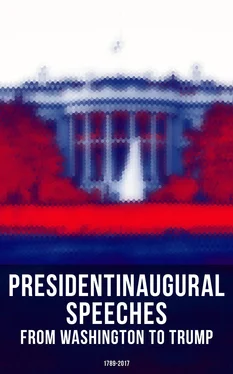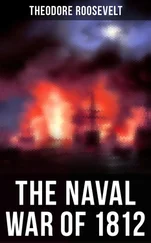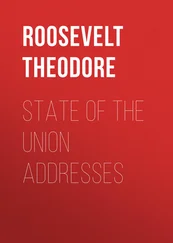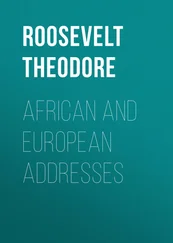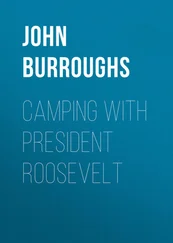1 ...6 7 8 10 11 12 ...20 Such, then, is the happy Government under which we live—a Government adequate to every purpose for which the social compact is formed; a Government elective in all its branches, under which every citizen may by his merit obtain the highest trust recognized by the Constitution; which contains within it no cause of discord, none to put at variance one portion of the community with another; a Government which protects every citizen in the full enjoyment of his rights, and is able to protect the nation against injustice from foreign powers.
Other considerations of the highest importance admonish us to cherish our Union and to cling to the Government which supports it. Fortunate as we are in our political institutions, we have not been less so in other circumstances on which our prosperity and happiness essentially depend. Situated within the temperate zone, and extending through many degrees of latitude along the Atlantic, the United States enjoy all the varieties of climate, and every production incident to that portion of the globe. Penetrating internally to the Great Lakes and beyond the sources of the great rivers which communicate through our whole interior, no country was ever happier with respect to its domain. Blessed, too, with a fertile soil, our produce has always been very abundant, leaving, even in years the least favorable, a surplus for the wants of our fellow-men in other countries. Such is our peculiar felicity that there is not a part of our Union that is not particularly interested in preserving it. The great agricultural interest of the nation prospers under its protection. Local interests are not less fostered by it. Our fellow-citizens of the North engaged in navigation find great encouragement in being made the favored carriers of the vast productions of the other portions of the United States, while the inhabitants of these are amply recompensed, in their turn, by the nursery for seamen and naval force thus formed and reared up for the support of our common rights. Our manufactures find a generous encouragement by the policy which patronizes domestic industry, and the surplus of our produce a steady and profitable market by local wants in less-favored parts at home.
Such, then, being the highly favored condition of our country, it is the interest of every citizen to maintain it. What are the dangers which menace us? If any exist they ought to be ascertained and guarded against.
In explaining my sentiments on this subject it may be asked, What raised us to the present happy state? How did we accomplish the Revolution? How remedy the defects of the first instrument of our Union, by infusing into the National Government sufficient power for national purposes, without impairing the just rights of the States or affecting those of individuals? How sustain and pass with glory through the late war? The Government has been in the hands of the people. To the people, therefore, and to the faithful and able depositaries of their trust is the credit due. Had the people of the United States been educated in different principles, had they been less intelligent, less independent, or less virtuous, can it be believed that we should have maintained the same steady and consistent career or been blessed with the same success? While, then, the constituent body retains its present sound and healthful state everything will be safe. They will choose competent and faithful representatives for every department. It is only when the people become ignorant and corrupt, when they degenerate into a populace, that they are incapable of exercising the sovereignty. Usurpation is then an easy attainment, and an usurper soon found. The people themselves become the willing instruments of their own debasement and ruin. Let us, then, look to the great cause, and endeavor to preserve it in full force. Let us by all wise and constitutional measures promote intelligence among the people as the best means of preserving our liberties.
Dangers from abroad are not less deserving of attention. Experiencing the fortune of other nations, the United States may be again involved in war, and it may in that event be the object of the adverse party to overset our Government, to break our Union, and demolish us as a nation. Our distance from Europe and the just, moderate, and pacific policy of our Government may form some security against these dangers, but they ought to be anticipated and guarded against. Many of our citizens are engaged in commerce and navigation, and all of them are in a certain degree dependent on their prosperous state. Many are engaged in the fisheries. These interests are exposed to invasion in the wars between other powers, and we should disregard the faithful admonition of experience if we did not expect it. We must support our rights or lose our character, and with it, perhaps, our liberties. A people who fail to do it can scarcely be said to hold a place among independent nations. National honor is national property of the highest value. The sentiment in the mind of every citizen is national strength. It ought therefore to be cherished.
To secure us against these dangers our coast and inland frontiers should be fortified, our Army and Navy, regulated upon just principles as to the force of each, be kept in perfect order, and our militia be placed on the best practicable footing. To put our extensive coast in such a state of defense as to secure our cities and interior from invasion will be attended with expense, but the work when finished will be permanent, and it is fair to presume that a single campaign of invasion by a naval force superior to our own, aided by a few thousand land troops, would expose us to greater expense, without taking into the estimate the loss of property and distress of our citizens, than would be sufficient for this great work. Our land and naval forces should be moderate, but adequate to the necessary purposes—the former to garrison and preserve our fortifications and to meet the first invasions of a foreign foe, and, while constituting the elements of a greater force, to preserve the science as well as all the necessary implements of war in a state to be brought into activity in the event of war; the latter, retained within the limits proper in a state of peace, might aid in maintaining the neutrality of the United States with dignity in the wars of other powers and in saving the property of their citizens from spoliation. In time of war, with the enlargement of which the great naval resources of the country render it susceptible, and which should be duly fostered in time of peace, it would contribute essentially, both as an auxiliary of defense and as a powerful engine of annoyance, to diminish the calamities of war and to bring the war to a speedy and honorable termination.
But it ought always to be held prominently in view that the safety of these States and of everything dear to a free people must depend in an eminent degree on the militia. Invasions may be made too formidable to be resisted by any land and naval force which it would comport either with the principles of our Government or the circumstances of the United States to maintain. In such cases recourse must be had to the great body of the people, and in a manner to produce the best effect. It is of the highest importance, therefore, that they be so organized and trained as to be prepared for any emergency. The arrangement should be such as to put at the command of the Government the ardent patriotism and youthful vigor of the country. If formed on equal and just principles, it can not be oppressive. It is the crisis which makes the pressure, and not the laws which provide a remedy for it. This arrangement should be formed, too, in time of peace, to be the better prepared for war. With such an organization of such a people the United States have nothing to dread from foreign invasion. At its approach an overwhelming force of gallant men might always be put in motion.
Читать дальше
